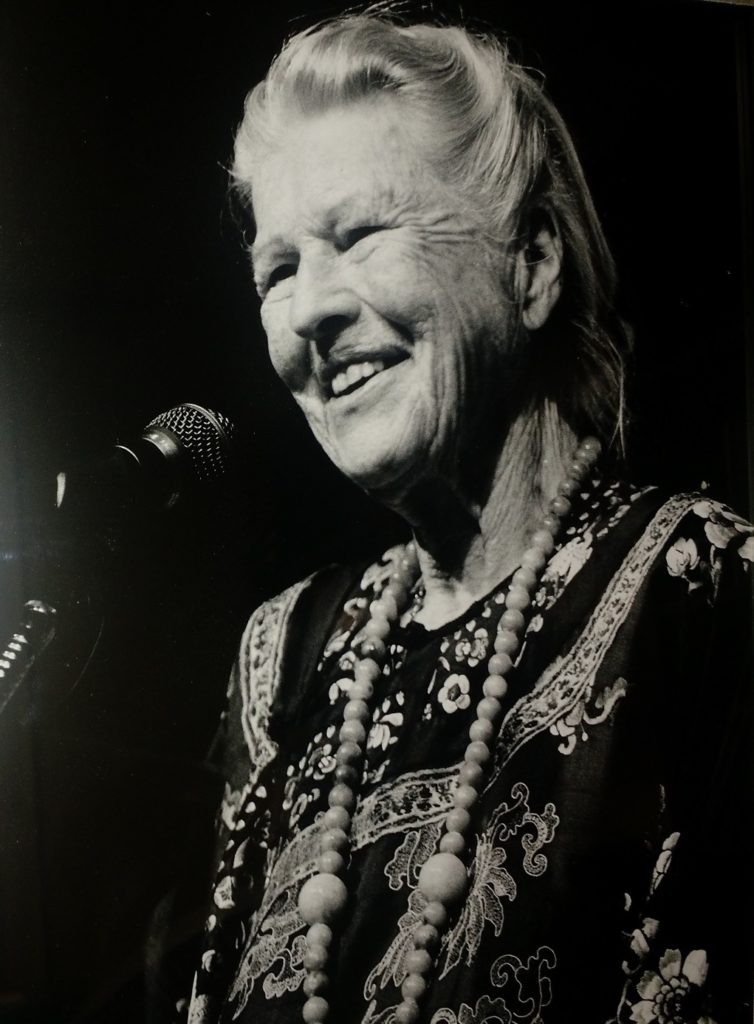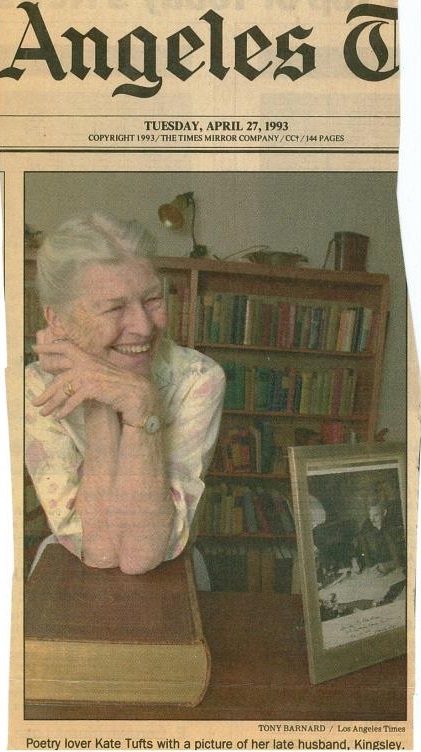Kate Tufts: Her Love of Poetry

In 1993, just one year after the Kingsley Tufts Award was first presented, Claremont Graduate University created an additional poetry award in Kate Tufts’ honor. Unlike the larger prize bearing her husband’s name given to established poets in the middle of their careers, the Kate Tufts Discovery Award instead rewards emerging poets with tremendous promise. And for the last twenty-three years, Kate Tufts winners have enjoyed the confidence boost to their creativity and the increased recognition that comes along with the accolade’s cash prize.
But who exactly was Kate Tufts, and why is her name affixed to such an important poetry endowment? Since her death in 1997 at the age of 86, those who were not fortunate enough to have made her acquaintance are mostly left to sift through faded newspaper clippings and previous Tufts Awards event speeches in search of adequate answers to these questions.
What emerges is an image of Kate Tufts as a clever and dedicated woman who led an interesting and enjoyable life. She has been described as “the spitting image of Katharine Hepburn…a woman of nimble intellect and elegance, of quick, candid, salty wit and fine sensibility” (Maguire). Her recollected stories found in CGU’s Tufts archive are compelling. Katherine Frost was born in 1891. And when she was only three years old her mother and brother both drowned in the California ocean, leaving her alone at the Corona Del Mar pier. Her father, physician Lowell Frost, was incorrectly informed that his entire family had perished but his daughter came “back from the dead” when authorities informed him of their mistake (Maguire). Often these recounted tales are not tragic, but instead reflect Kate’s wry humor. A later anecdote demonstrates her engaging personality. About four years after Kingsley’s death, Kate’s physician stressed her need to quit smoking but she found a handy loophole. Though most of her smoking friends were deceased, she would stroll down a few blocks of Wilshire Boulevard from her nearby condo and briefly step into a local sports bar to “take a few deep breaths. ‘Just that would do me for several hours!’” (Maguire).
Most importantly, these collected stories concerning Kate Tufts consistently depict a person committed wholeheartedly to poetry. After inheriting her father’s spacious home in the Hollywood Hills and its vast accompanying acreage, Kate and her husband knew that despite the increasing difficulties of inhabiting the remote 14-roomed house that “the longer they waited, the more the property would bring on the auction block” (Wallace). The longer they persevered regardless of the strain, the larger poetry endowment they could establish. And following Kingsley Tufts’ death in 1991, Kate did exactly that. Even though “to create the award she had to sell the house in which she was born…No matter that she now lives in a condominium the size of her former living room” (Wallace). For it was “this house – and eventually virtually all her worldly goods – that Kate was bent on giving to create a prize” (Maguire).
Even her selection of a host university for Kingsley’s honorary poetry award was not made lightheartedly. Reportedly, she tried “that ‘great university to the north’ and didn’t like it,” instead pinpointing Claremont Graduate University (which she referred to as “the American Oxford”) in favor of Stanford due to CGU’s “reputation, its style and its values…[and] people who clearly shared her passion and love for poetry” (Maguire). After careful consideration, Kate deemed CGU “the perfect permanent home for her award” (Maguire). In interviews, Kate herself seemed offhanded about her own undeniable dedication and sacrifice: “I knew what I had to do…Kingsley Tufts was the love of my life…And this his fondest wish” (Wallace).

Perhaps one of the most striking aspects of Kate Tufts life was her successful and lengthy marriage to Kingsley, a coexistence both centered on and captured in poetry. Married in 1933, for almost sixty years “poetry ran like a silver thread through the center of Kingsley and Kate Tufts’ love affair” (Wallace). In addition to sharing a “passion for verse,” the Tufts were involved in not just the appreciation of poetry but also its creation (Wallace). When Kingsley began writing as a personal hobby in the 1930s, Kate was there right by his side acting as an encouraging helpmate and eager audience. And why not? The poems were often about her, depicting the seasons of their love and the life they were building together. In “Kathleen,” Kingsley describes the delicate and mythic nature of his affection: “my love, Kathleen / Is like the softest touch between / Two wings, two seeds, two stones” (13). The poet observes in “Togetherness” that Kate acts as his securing force: “The kite against the blue / The sail against the sea / By cord and mast are held / As you hold me” (Tufts 14). “Together we are more than two / Yet less than three,” Kingsley claims in “Our Other Self,” reflecting on their close bond as husband and wife: “It seems to be a self we share” (Tufts 17). And in “The Golden Years,” Tufts recounts their long, fulfilled life together:
Through candlelight
And crystal year
Our love was warm and true;
Each tender night
Was silver bright
At our table set for two. (30)
It is extremely fitting that Kate Tufts’ name appears on CGU’s poetry award for beginning poets just embarking upon their creative careers. For Kate was there since the beginning of Kingsley’s poetic efforts, offering unflagging support and inspiration. Just as she provided her husband with encouragement as a creator while living, through the Kate Tufts Discovery Award Claremont Graduate University continues to offer outstanding new poets needed recognition in her honor.
—Brock Rustin
________________________________________
Further Reading:
Maguire, John D. “A Historical Note on the Kingsley and Kate Tufts Poetry Awards.” Kingsley Tufts Poetry Awards Program. Claremont Graduate University, Claremont CA. 26 April 2002. Speech.
Tufts, Kingsley. After Images: The Collected Poems of Kingsley Tufts. Santa Barbara, CA: Fithian Press, 1994. Print.
Wallace, Amy. “Love Is This: A Poetry of Bliss, A Prize Inspired.” The Los Angeles Times [Los Angeles] 27 Apr. 1993.
Share